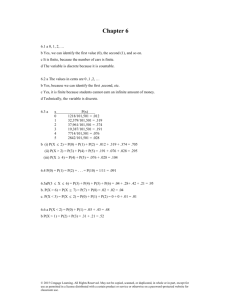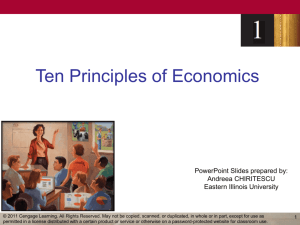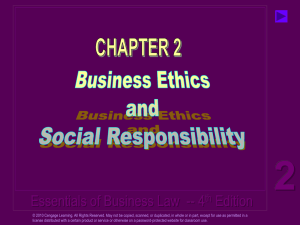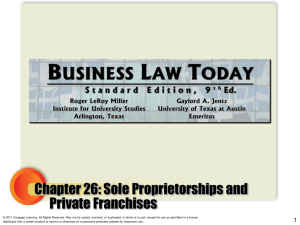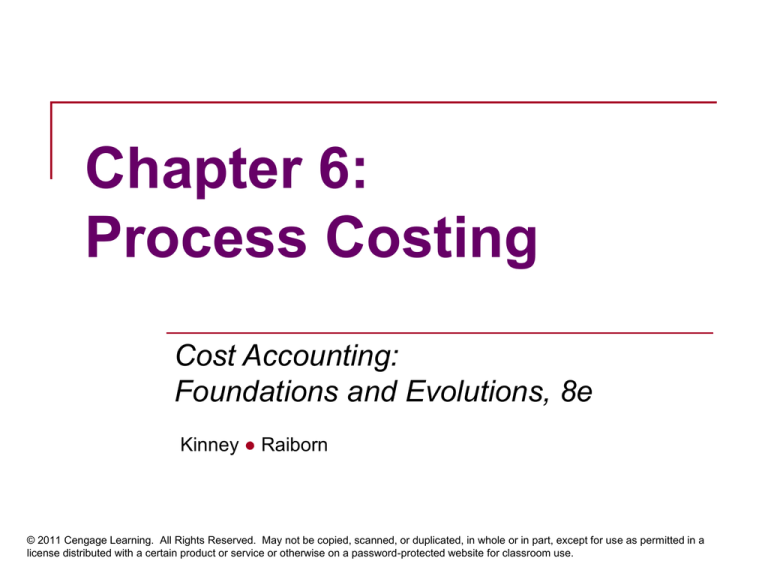
Chapter 6:
Process Costing
Cost Accounting:
Foundations and Evolutions, 8e
Kinney ● Raiborn
© 2011 Cengage Learning. All Rights Reserved. May not be copied, scanned, or duplicated, in whole or in part, except for use as permitted in a
license distributed with a certain product or service or otherwise on a password-protected website for classroom use.
Learning Objectives
Why are equivalent units of production used in process costing?
How are equivalent units of production, unit costs, and inventory values
determined using the weighted average (WA) method of process
costing?
How are equivalent units of production, unit costs, and inventory values
determined using the first-in, first-out (FIFO) method of process costing?
How are transferred-in costs and units accounted for in a
multidepartment production setting?
How are equivalent units of production, unit costs, and inventory values
determined using the standard costing method of process costing?
Why would a company use a hybrid costing system?
(Appendix 1) What alternative methods can be used to calculate
equivalent units of production?
(Appendix 2) How are normal and abnormal spoilage losses treated in
an EUP schedule?
© 2011 Cengage Learning. All Rights Reserved. May not be copied, scanned, or duplicated, in whole or in part, except for use as permitted in
a license distributed with a certain product or service or otherwise on a password-protected website for classroom use.
Job Order vs. Process Costing
Job Order
Small quantities of
distinct products or
services
Assign costs to job and
then to units within the
job
Process Costing
Large quantities of
homogeneous products
or services
Using an averaging
technique, assign costs
directly to units
produced during the
period
© 2011 Cengage Learning. All Rights Reserved. May not be copied, scanned, or duplicated, in whole or in part, except for use as permitted in
a license distributed with a certain product or service or otherwise on a password-protected website for classroom use.
Process Costing
Averaging technique to assign costs to units
produced
Unit Cost =
Production Costs
Production Quantity
© 2011 Cengage Learning. All Rights Reserved. May not be copied, scanned, or duplicated, in whole or in part, except for use as permitted in
a license distributed with a certain product or service or otherwise on a password-protected website for classroom use.
Production Costs
The Numerator—Production Costs
Accumulate costs by department
Accumulate costs by product
Direct material from material requisitions
Direct labor from time sheets and wage rates
Overhead
Actual
Predetermined application rates
Unit Cost =
Production Costs
Production Quantity
© 2011 Cengage Learning. All Rights Reserved. May not be copied, scanned, or duplicated, in whole or in part, except for use as permitted in
a license distributed with a certain product or service or otherwise on a password-protected website for classroom use.
© 2011 Cengage Learning. All Rights Reserved. May not be copied, scanned, or duplicated, in whole or in part, except for use as permitted in
a license distributed with a certain product or service or otherwise on a password-protected website for classroom use.
Materials Requisition Form
Date ___________________
No. 341
Job No. _________________ Department _______________
Authorized by ___________ Issued by _________________
Received by _____________ Inspected by _______________
Item Part
Unit of Quantity Quantity Unit Total
No. No. Descrip. Measure Required Issued Cost Cost
© 2011 Cengage Learning. All Rights Reserved. May not be copied, scanned, or duplicated, in whole or in part, except for use as permitted in
a license distributed with a certain product or service or otherwise on a password-protected website for classroom use.
Employee Time Sheet
Employee Name _______________
Employee No. _______________
Department
_______________
Type of Work
Job No.
Employee Signature
Start
Time
For week ending
_______
Stop
Time
Day
Total
Hours
Supervisor’s Signature
© 2011 Cengage Learning. All Rights Reserved. May not be copied, scanned, or duplicated, in whole or in part, except for use as permitted in
a license distributed with a certain product or service or otherwise on a password-protected website for classroom use.
Units Produced
The Denominator—Units Produced
Complicated by work in process
Units started last period and completed this period
Units started this period and not completed
Convert partially completed units to
equivalent whole units
Unit Cost =
Production Costs
Production Quantity
© 2011 Cengage Learning. All Rights Reserved. May not be copied, scanned, or duplicated, in whole or in part, except for use as permitted in
a license distributed with a certain product or service or otherwise on a password-protected website for classroom use.
Equivalent Units of Production
Approximation of the number of whole
units of output that could have been
produced from the actual effort expended
Includes units
Started last period and finished this period
Started and finished this period
Started this period and not finished
Assumes FIFO physical flow through the
production department
© 2011 Cengage Learning. All Rights Reserved. May not be copied, scanned, or duplicated, in whole or in part, except for use as permitted in
a license distributed with a certain product or service or otherwise on a password-protected website for classroom use.
© 2011 Cengage Learning. All Rights Reserved. May not be copied, scanned, or duplicated, in whole or in part, except for use as permitted in
a license distributed with a certain product or service or otherwise on a password-protected website for classroom use.
Two Process Costing Methods
Weighted Average (WA) Method
Combines
beginning work in process
current period production
First-in, First-Out (FIFO) Method
Separates
beginning work in process
current period production
© 2011 Cengage Learning. All Rights Reserved. May not be copied, scanned, or duplicated, in whole or in part, except for use as permitted in
a license distributed with a certain product or service or otherwise on a password-protected website for classroom use.
Process Costing Methods
WA
Beginning WIP
Started and finished
Ending WIP
The Difference
FIFO
Beginning WIP
Started and finished
Ending WIP
100%
100%
% completed
% completed
100%
% completed
© 2011 Cengage Learning. All Rights Reserved. May not be copied, scanned, or duplicated, in whole or in part, except for use as permitted in
a license distributed with a certain product or service or otherwise on a password-protected website for classroom use.
Process Costing
Direct material
Direct labor
Added at the beginning, during, and/or at the end
of process
Added throughout the process
Overhead
Added throughout the process
Based on direct labor
Based on other, multiple cost drivers
© 2011 Cengage Learning. All Rights Reserved. May not be copied, scanned, or duplicated, in whole or in part, except for use as permitted in
a license distributed with a certain product or service or otherwise on a password-protected website for classroom use.
© 2011 Cengage Learning. All Rights Reserved. May not be copied, scanned, or duplicated, in whole or in part, except for use as permitted in
a license distributed with a certain product or service or otherwise on a password-protected website for classroom use.
Process Costing Steps
1
2
3
4
5
6
Units to account for
Units
Units accounted for
Determine equivalent units
Costs to account for
Costs
Compute cost per equivalent unit
Assign costs to inventories
© 2011 Cengage Learning. All Rights Reserved. May not be copied, scanned, or duplicated, in whole or in part, except for use as permitted in
a license distributed with a certain product or service or otherwise on a password-protected website for classroom use.
Cost of Production Report
Name of Department
for the period --Production Data:
Units to account for
Units accounted for
EUP for each cost
Cost Data:
Costs to account for
Cost per EUP
Cost Assignment:
Transferred Out
Ending Work in Process Inventory
* Numbers correlate to the
process costing steps in the
previous slide
© 2011 Cengage Learning. All Rights Reserved. May not be copied, scanned, or duplicated, in whole or in part, except for use as permitted in
a license distributed with a certain product or service or otherwise on a password-protected website for classroom use.
Step 1—Units to Account For
Beginning WIP
Started
Units to account for
5,000
200,700
205,700
© 2011 Cengage Learning. All Rights Reserved. May not be copied, scanned, or duplicated, in whole or in part, except for use as permitted in
a license distributed with a certain product or service or otherwise on a password-protected website for classroom use.
Step 2—Units Accounted For
Beginning WIP
Started
Units to account for
Finished and transferred
Ending WIP
Units accounted for
5,000
200,700
205,700
must
203,000 be
equal
2,700
205,700
© 2011 Cengage Learning. All Rights Reserved. May not be copied, scanned, or duplicated, in whole or in part, except for use as permitted in
a license distributed with a certain product or service or otherwise on a password-protected website for classroom use.
Step 3—Compute Equivalent Units
Beginning WIP inventory
Started and completed
Ending WIP inventory
Equivalent units
WA Method
DM Conversion
5,000
5,000
198,000
198,000
2,700
2,160*
205,700
205,160
* ending units * % complete
2,700 * 80% = 2,160
© 2011 Cengage Learning. All Rights Reserved. May not be copied, scanned, or duplicated, in whole or in part, except for use as permitted in
a license distributed with a certain product or service or otherwise on a password-protected website for classroom use.
Step 4—Costs to Account For
Beginning WIP
Current costs
To account for
DM
Conversion
Total
$ 5,943 $ 16,758 $ 22,701
321,120 660,270 981,390
$327,063 $677,028 $1,004,091
WA Method
© 2011 Cengage Learning. All Rights Reserved. May not be copied, scanned, or duplicated, in whole or in part, except for use as permitted in
a license distributed with a certain product or service or otherwise on a password-protected website for classroom use.
Step 5—Cost per Equivalent Unit
Beginning WIP
Current costs
To account for
DM
Conversion Total
$ 5,943 $ 16,758 $ 22,701
321,120
660,270
981,390
$327,063 $677,028 $1,004,091
Divide by EUP
205,700
Cost per EUP
$1.59
205,160
+ $3.30
= $4.89
WA Method
© 2011 Cengage Learning. All Rights Reserved. May not be copied, scanned, or duplicated, in whole or in part, except for use as permitted in
a license distributed with a certain product or service or otherwise on a password-protected website for classroom use.
Step 6—Assign Costs to Inventories
Transferred (203,000 * $4.89)
$992,670
Ending WIP Inventory
Transferred
Direct Materials
Out
Ending
(2,700 * $1.59)
$4,293
WIP
Conversion Costs
(2,700 * 80% * $3.30)
7,128
11,421
Cost accounted for
$1,004,091*
*must agree with costs to account for
WA Method
© 2011 Cengage Learning. All Rights Reserved. May not be copied, scanned, or duplicated, in whole or in part, except for use as permitted in
a license distributed with a certain product or service or otherwise on a password-protected website for classroom use.
Process Costing—FIFO
Emphasizes current period costs and
production
Steps 1, 2, and 4 are the same
© 2011 Cengage Learning. All Rights Reserved. May not be copied, scanned, or duplicated, in whole or in part, except for use as permitted in
a license distributed with a certain product or service or otherwise on a password-protected website for classroom use.
Step 3—Compute Equivalent Units
Beginning WIP/completed
Started and completed
Ending WIP Inventory
Equivalent units
FIFO Method
DM Conversion
0
3,000*
198,000
198,000
2,700
2,160
200,700
203,160
* beginning units * % complete in current period
5,000 * 60% = 3,000
© 2011 Cengage Learning. All Rights Reserved. May not be copied, scanned, or duplicated, in whole or in part, except for use as permitted in
a license distributed with a certain product or service or otherwise on a password-protected website for classroom use.
Step 5—Cost per Equivalent Unit
Current costs
DM
$321,120
Divide by EUP
200,700
Cost per EUP
$1.60
FIFO Method
Conversion
Total
$660,270 $981,390
203,160
+
$3.25 = $4.85
* Recall that Step 4 is the same
as used for the WA method
© 2011 Cengage Learning. All Rights Reserved. May not be copied, scanned, or duplicated, in whole or in part, except for use as permitted in
a license distributed with a certain product or service or otherwise on a password-protected website for classroom use.
Step 6—Assign Costs to Inventories
Transferred
Beginning WIP Inventory
Cost to complete
Conversion (3,000 * $3.25)
Started and completed
(198,000 * $4.85)
Total cost transferred
Ending inventory
Direct Materials
(2,700 * $1.60)
Conversion Costs
(2,7000 * 80% * $3.25)
Cost accounted for
*must agree with costs to account for
$22,701
9,750
Transferred
Out
$ 32,451
960,300
$992,751
Ending
WIP
$4,320
7,020
11,340
$1,004,091*
FIFO Method
© 2011 Cengage Learning. All Rights Reserved. May not be copied, scanned, or duplicated, in whole or in part, except for use as permitted in
a license distributed with a certain product or service or otherwise on a password-protected website for classroom use.
Process Costing Comparison
WA
FIFO
EUP DM
205,700 EUP DM
200,700
EUP Conversion 205,160
EUP Conversion 203,160
Cost per unit DM
$1.59 Cost per unit DM $1.60
Cost per unit Conv. 3.30
Cost per unit Conv. 3.25
Total
$4.89 Total
$4.85
Transferred Out $992,670 Transferred Out $992,751
Ending WIP
11,421 Ending WIP
11,340
Total
$1,004,091 Total
$1,004,091
© 2011 Cengage Learning. All Rights Reserved. May not be copied, scanned, or duplicated, in whole or in part, except for use as permitted in
a license distributed with a certain product or service or otherwise on a password-protected website for classroom use.
Process Costing
The purpose of the six steps
Assign a value to ending work in process
Assign a value to items transferred out
Prepare this journal entry
Finished Goods
Work in Process
or
Transferred-In Cost (successor department)
Work in Process (current department)
© 2011 Cengage Learning. All Rights Reserved. May not be copied, scanned, or duplicated, in whole or in part, except for use as permitted in
a license distributed with a certain product or service or otherwise on a password-protected website for classroom use.
Multidepartment Processing
Materials
Process 1
Process 2
Transferred-In
Cost
Finished
Product
Wait
Process 3
Wait
© 2011 Cengage Learning. All Rights Reserved. May not be copied, scanned, or duplicated, in whole or in part, except for use as permitted in
a license distributed with a certain product or service or otherwise on a password-protected website for classroom use.
Process Costing with Standard Costs
Simplify costing process
Eliminate periodic cost recomputations
Same as FIFO computations
Emphasize current period costs and production
Inventories are stated at standard cost
Variances are calculated for material, labor, and
overhead
Assigns a “normal” production cost to the equivalent
units of output each period
Allows managers to quickly recognize and investigate
significant deviations from expected production costs
Allows benchmarking with other firms
© 2011 Cengage Learning. All Rights Reserved. May not be copied, scanned, or duplicated, in whole or in part, except for use as permitted in
a license distributed with a certain product or service or otherwise on a password-protected website for classroom use.
Hybrid Costing Systems
Characteristics of job order and process costing
systems
Various product lines
Different direct material—job order costing
Different direct labor—job order costing
Same process—process costing
Hybrid costing used for furniture, clothing, jam
© 2011 Cengage Learning. All Rights Reserved. May not be copied, scanned, or duplicated, in whole or in part, except for use as permitted in
a license distributed with a certain product or service or otherwise on a password-protected website for classroom use.
Appendix 1—
Alternative Cost Computation
There are two alternative methods to
calculate WA and FIFO EUP
Use alternative methods
To confirm standard computation
As a simplified computation
© 2011 Cengage Learning. All Rights Reserved. May not be copied, scanned, or duplicated, in whole or in part, except for use as permitted in
a license distributed with a certain product or service or otherwise on a password-protected website for classroom use.
Appendix 1—
Traditional Cost Computation
Conversion Costs
Beginning WIP inventory
Started and completed
Ending WIP inventory
Equivalent units
WA
5,000
198,000
2,160
205,160
FIFO
3,000
198,000
2,160
203,160
© 2011 Cengage Learning. All Rights Reserved. May not be copied, scanned, or duplicated, in whole or in part, except for use as permitted in
a license distributed with a certain product or service or otherwise on a password-protected website for classroom use.
Appendix 1—
Alternative Cost Computation 1
Units transferred out (whole units)
Plus: Ending work in process (equivalent units)
WA EUP
Less: Beginning work in process (equivalent units)
FIFO EUP
© 2011 Cengage Learning. All Rights Reserved. May not be copied, scanned, or duplicated, in whole or in part, except for use as permitted in
a license distributed with a certain product or service or otherwise on a password-protected website for classroom use.
Appendix 1—
Alternative Cost Computation 1
Conversion Costs
Candles transferred
Ending WIP EUP
WA EUP
Beginning WIP EUP
FIFO EUP
203,000
2,160
205,160
(2,000)
203,160
© 2011 Cengage Learning. All Rights Reserved. May not be copied, scanned, or duplicated, in whole or in part, except for use as permitted in
a license distributed with a certain product or service or otherwise on a password-protected website for classroom use.
Appendix 1—
Alternative Cost Computation 2
Total units to account for
Less: EUP to be completed next period
WA EUP
Less : EUP completed in prior period
FIFO EUP
© 2011 Cengage Learning. All Rights Reserved. May not be copied, scanned, or duplicated, in whole or in part, except for use as permitted in
a license distributed with a certain product or service or otherwise on a password-protected website for classroom use.
Appendix 1—
Alternative Cost Computation 2
Conversion Costs
Total units to account for
EUP to be completed next period
WA EUP
205,160
EUP completed in prior period
FIFO EUP
205,700
(540)
(2,000)
203,160
© 2011 Cengage Learning. All Rights Reserved. May not be copied, scanned, or duplicated, in whole or in part, except for use as permitted in
a license distributed with a certain product or service or otherwise on a password-protected website for classroom use.
Appendix 2—Spoilage
Continuous loss—Loss occurs fairly
uniformly through the process
Discrete loss—Loss occurs at a specific
point and is detectable only when a
quality check is performed
© 2011 Cengage Learning. All Rights Reserved. May not be copied, scanned, or duplicated, in whole or in part, except for use as permitted in
a license distributed with a certain product or service or otherwise on a password-protected website for classroom use.
Appendix 2—Spoilage
Normal shrinkage and continuous losses
Use Method of Neglect
Assign costs only to units that have passed the
inspection point
Excludes spoiled units in the equivalent units schedule
Spreads cost of lost units proportionately over the
good units transferred and those remaining in WIP
inventory
Abnormal losses
Period expense
Accounted for on an equivalent unit basis
© 2011 Cengage Learning. All Rights Reserved. May not be copied, scanned, or duplicated, in whole or in part, except for use as permitted in
a license distributed with a certain product or service or otherwise on a password-protected website for classroom use.
Appendix 2—Spoilage
Normal
Spoilage
Continuous
Loss
Discrete
Loss
Abnormal
Spoilage
Loss in all ending
inventory and
transferred-out units
on an EUP basis
Period expense
in EUP
Loss in all units past
inspection point in
ending inventory and
transferred out on an
EUP basis
Period expense
in EUP
© 2011 Cengage Learning. All Rights Reserved. May not be copied, scanned, or duplicated, in whole or in part, except for use as permitted in
a license distributed with a certain product or service or otherwise on a password-protected website for classroom use.
Questions
What is an EUP?
What is the difference between the WA and
FIFO methods of calculating equivalent
units?
Why would a company use a hybrid costing
system?
© 2011 Cengage Learning. All Rights Reserved. May not be copied, scanned, or duplicated, in whole or in part, except for use as permitted in
a license distributed with a certain product or service or otherwise on a password-protected website for classroom use.
Potential Ethical Issues
Over- or underestimating completion %
for ending WIP inventory to distort results
Using outdated standard costs
Ignoring the assignment of significant
direct costs to specific jobs
Treating abnormal spoilage as normal
spoilage
© 2011 Cengage Learning. All Rights Reserved. May not be copied, scanned, or duplicated, in whole or in part, except for use as permitted in
a license distributed with a certain product or service or otherwise on a password-protected website for classroom use.


